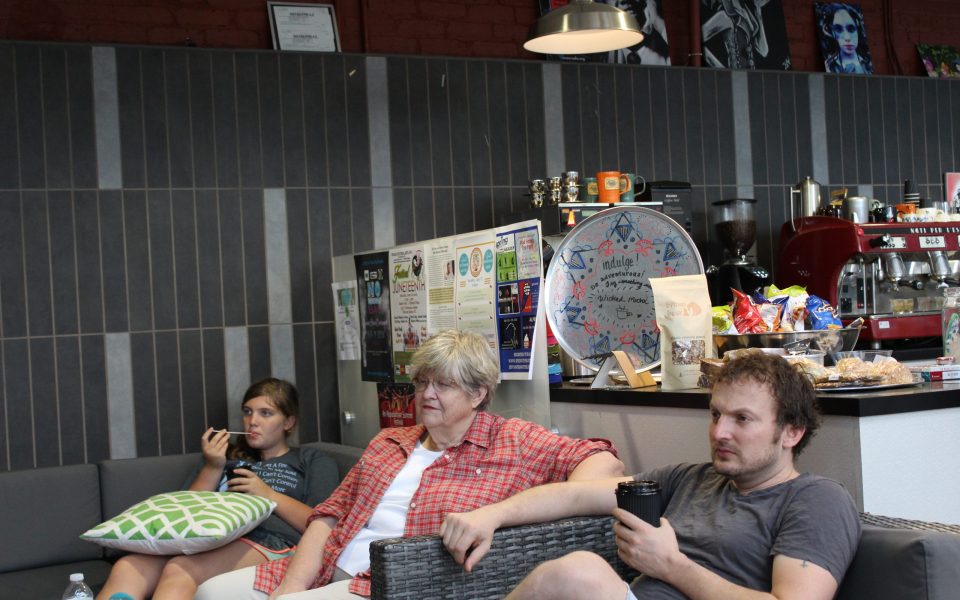by Naari Honor
One of the things that makes poetry different,” Ismael Khatibu said, “is that poetry is very much in the moment.”
At that moment a mix of young teens and adults gathered at the Coffee Park Downtown in the Milton Rhodes Center for the Arts in Winston-Salem to listen to him recite excerpts from Jaqueline Woodson’s novel, Brown Girl Dreaming, on July 7.
Even though the words spoken by Khatibu were not crafted from his own pen, his dynamic voice breathed life into them as if he were a kindred spirit with their creator. He began the reading with “Home,” a poem selected by his 11-year-old son.
Khatibu’s voice seemed to entrance the audience while he read from the Newbery Honor-winning work of literature. Some children looked at their parents as if searching for the right way to respond as he recited, while others closed their eyes in an attempt to recreate the scene he depicted within their own minds.
Khatibu explained how the body’s senses can be used when writing poetry to create a verbal representation of vivid imagery.
After finishing “Home”, another of Woodson’s poems, Khatibu began to recite a piece that instantly caught the attention of those in the audience. “Greenville 1963” shares the author’s observations of her mother being made to carry herself a certain way due to racial tensions that were occurring at the time.
At the end of his reading, the silence was broken and the patrons started to offer feedback in an intimate discussion about the author’s work that captured her experience as an African-American child growing up in the South in the 1960s and ’70s.
While Khatibu describes himself as “a thinker who can articulate what is on his mind” rather than a poet, he is known to many around the Triad as an award-winning slam poet who organized the Piedmont Spoken & Literary Arts Movement, or SLAM, in an effort to build community around the literary arts.
These days Khatibu spends less time on the slam poetry circuit and uses his talent and experience to help educate young people. Several of his efforts have been in conjunction with Bookmarks. Rachel Kuhn Stinehelfer, who runs the Authors & Schools program for Bookmarks, was responsible for organizing the book discussion event and inviting Khatibu to come and speak.
“We chose Brown Girl Dreaming since the author will be at our book festival in September and also because it is just a great book,” Stinehelfer said. “I had worked with Ismael Khatibu on a couple of other poetry visits with school kids and thought it would be a great fit for him to have a discussion of Brown Girl Dreaming.”
The Bookmarks festival has attracted award-winning writers such as Geoff Rodkey, author of Daddy Day Care. Similar to many literary greats who work with the nonprofit, Rodkey also spends time working with the additional programs Bookmarks offers through Winston-Salem/Forsyth County Schools.
Khatibu ended the discussion of Brown Girl Dreaming with an invitation for fellow poets in the audience to read their personally poetry out loud. A young child grabbed his father’s bicep and buried his face in the nook of his arm. Was he shy or was this his way of encouraging his dad to speak in front of the audience?
Although bits of incoherent chatter and adolescent giggles came from their direction, poetic verse does not, and so Khatibu shared words of his own.
The tone of his voice has changed from a place of a maternal soothing to a roar of a father who has seen his share of life’s struggles and wants nothing more than to be a better father as he read his piece tentatively titled, “Father to Son.”
The crowd started to clap at the end of his piece and then, remembering that Khatibu had taught them how to pay accolades in a poetry setting by finger-snapping, hands went up in the air.
The night wound down and the audience went from a small crowd to just Khatibu and the barista.
“How do you think the night went?” I asked.
“Pretty good,” Khatibu said.
He turned to gather his things with a smile on his face, no doubt proud of the moment he had just been a part of.
Join the First Amendment Society, a membership that goes directly to funding TCB‘s newsroom.
We believe that reporting can save the world.
The TCB First Amendment Society recognizes the vital role of a free, unfettered press with a bundling of local experiences designed to build community, and unique engagements with our newsroom that will help you understand, and shape, local journalism’s critical role in uplifting the people in our cities.
All revenue goes directly into the newsroom as reporters’ salaries and freelance commissions.


Leave a Reply